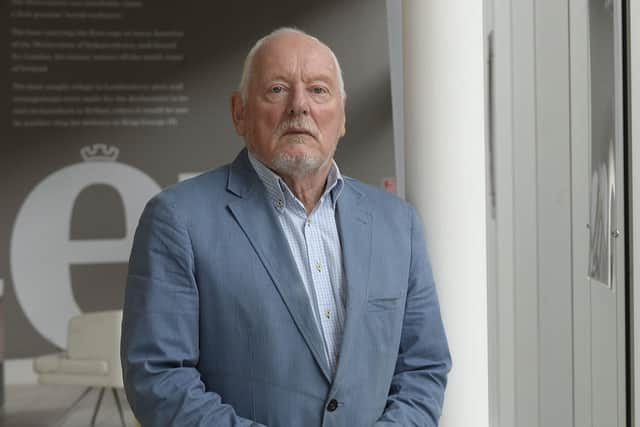Jeff Dudgeon: Our dissenting view on the legacy consensus was once again sidelined in the Lambeth Palace talks


Their statement lacked balance. They wrote “We have nonetheless heard the criticism that we should have done more to include a broader range of victims’ voices...we and our other stakeholders plan to engage in wider discussions with the victims’ sector and others.”
However I fear such discussions will not involve ‘others’ with a different view on legacy, who fear history is being rewritten to give terrorists and the state equivalence.
Advertisement
Hide AdAdvertisement
Hide AdThe imprimatur of the Archbishop of Canterbury was used to draw in top officials including Madeleine Alessandri, the NIO permanent secretary, MoD generals, Jon Boutcher of Kenova and various ex-paramilitaries. But only one legal option ‘on prosecutions and imprisonment’, the ‘Model Bill’ of QUB Professor Kieran McEvoy and the Committee for the Administration on Justice (CAJ), was discussed.


No unionist parties or non-nationalist victims’ groups were invited, so no other view was heard.
The QUB/CAJ ‘Model Bill’ had a recently added proposal of “reducing conflict-related imprisonment from two years to zero” which took account of the new strength of the veterans’ lobby.
It means trials are held but convicted soldiers and paramilitaries are not jailed — a further variant of an amnesty, with prosecutions rendered entirely meaningless.
Advertisement
Hide AdAdvertisement
Hide AdThe change would still permit trench lawfare against the security forces in the form of judicial reviews, public inquiries, reopened inquests, civil suits, damages claims, Strasbourg cases and private prosecutions.
They are unstoppable in legacy legislation.
The cheerleaders for the Stormont House Agreement are however determined to undermine the secretary of state’s outline plan of March 18 for narrowing legacy institutions, and cannot allow other options into the mix.
UUP leader Steve Aiken recently called on Queen’s University to create a professorship “to study unionism and its contribution to Northern Ireland”.
This idea was not well received, with many defending academic freedom for staff to express their ideas. I would concur on that freedom. It is the silent suppression of other ideas that is most concerning. Where are the genuine academic liberals of yesteryear?
Advertisement
Hide AdAdvertisement
Hide AdSome research on the websites of the law departments of Queen’s and Ulster University is revealing. At QUB, seven out of 14 law professors have transitional justice and human rights in their titles.
Kieran McEvoy for example is Professor of Law and Transitional Justice while Colin Harvey is Professor of Human Rights Law. Both universities now have Transitional Justice Institutes.
No research seems commissioned from another outlook.
This smacks of colonisation. Where once quiet unionists were accused of being dominant in the Queen’s law faculty, with just a smattering of liberals, matters are entirely reversed. Indeed I am aware of only one academic who has made a critical analysis of transitional justice and none who look at a human rights perspective from anything other than the dogma of ‘Article 2-compliance’.
Nothing for example has been published that considers the often competing demands in legacy of other European Convention on Human Rights (ECHR) articles, such as Nos. 6 and 8.
Another view, increasingly, cannot be conceived of.
Advertisement
Hide AdAdvertisement
Hide AdLast month, the former Attorney General John Larkin for NI tried to bring balance to the debate. He called for the existing Supreme Court ruling that the ECHR’s Article 2 could not apply before the Human Rights Act of 2020 to be put into legislation. This went undiscussed as nobody risked engaging but it would help to challenge at Strasbourg.
The Malone House Group, which I convene, has tried to counter the increasing consensus around the CAJ approach to legacy.
It is at present the only NGO that has put alternate legal views on those competing ECHR rights before the Council of Europe which enforces the court’s decisions.
They are on the Strasbourg website. I await an invitation to discuss them from the universities, the Archbishop and indeed the broadcasting media.
——— ———
A message from the Editor:
Advertisement
Hide AdAdvertisement
Hide AdThank you for reading this story on our website. While I have your attention, I also have an important request to make of you.
With the coronavirus lockdown having a major impact on many of our advertisers — and consequently the revenue we receive — we are more reliant than ever on you taking out a digital subscription.
Subscribe to newsletter.co.uk and enjoy unlimited access to the best Northern Ireland and UK news and information online and on our app. With a digital subscription, you can read more than 5 articles, see fewer ads, enjoy faster load times, and get access to exclusive newsletters and content. Visit https://www.newsletter.co.uk/subscriptions now to sign up.
Our journalism costs money and we rely on advertising, print and digital revenues to help to support them. By supporting us, we are able to support you in providing trusted, fact-checked content for this website.
Alistair Bushe
Editor